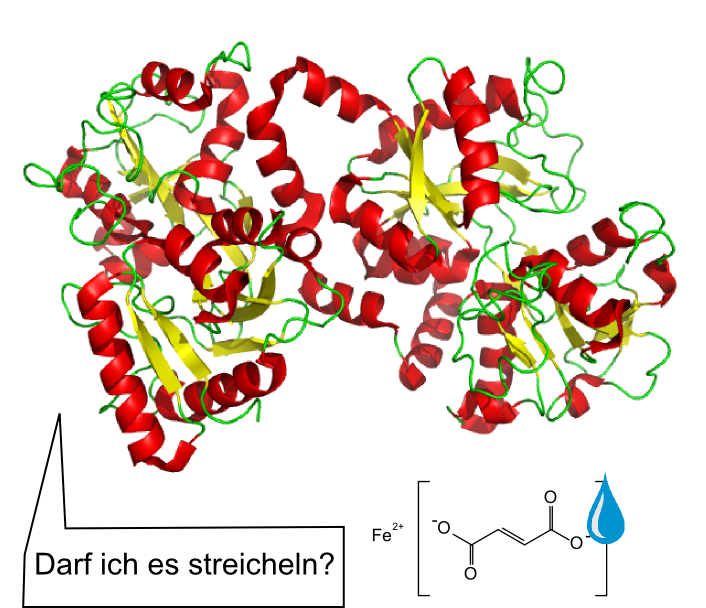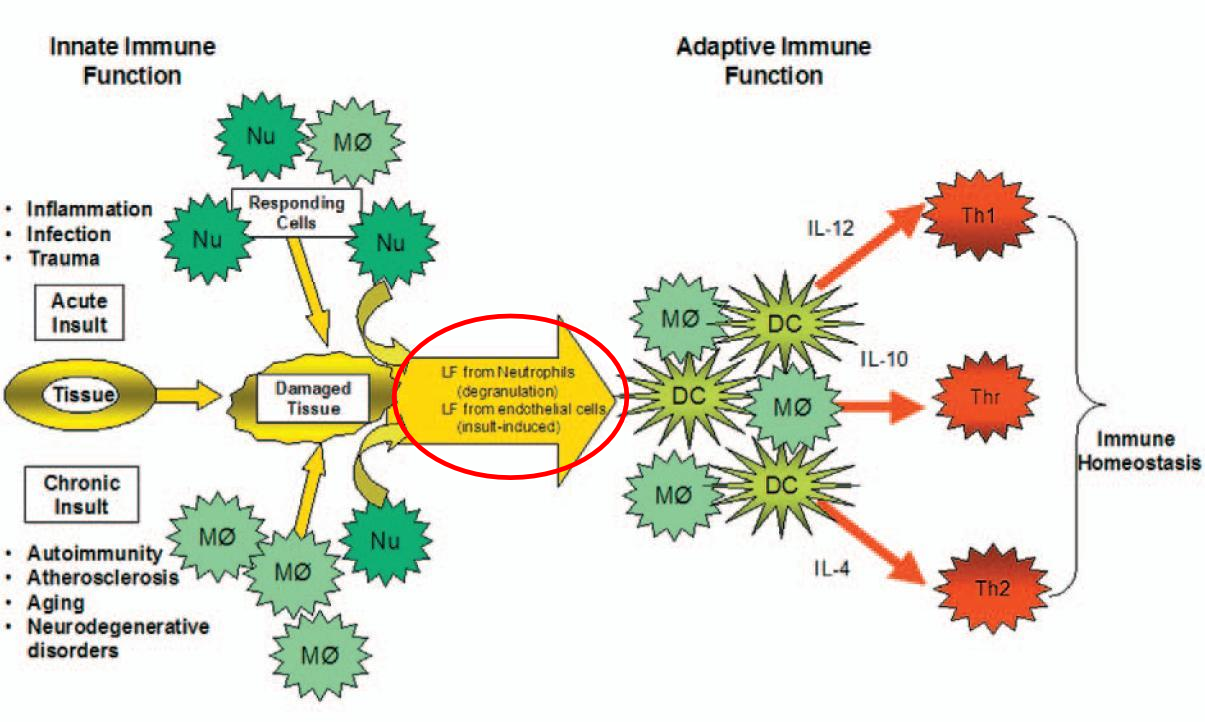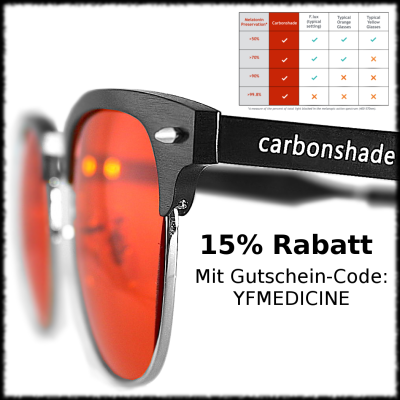Lactoferrin – Iron deficiency, iron overload, immunity, gut – what else? Part 1
Lactoferrin – Love for the „iron lady“
Of arrogant journalists and changed perspectives
Every day, supplements are swallowed all around the world. Many people would probably shake their heads if they looked at the data [1]. Reasons for that popularity can be body weight, aesthetics in general, health, performance and many other. Not to mention the plethora of courses, further trainings, books and so on. For more than a decade, I had become increasingly involved in this revenue-generating area called „Health & Fitness“ – as a regional leader, an instructor, and finally as a medical journalist. While at the beginning my interest in these little miracle pills was great (as a child I found the word alchemy just great), my distance to solutions in capsule form increased through dangerous half-knowledge and arrogance.
If you want to imitate nature, you first have to understand it – and we do not even understand water!
There is no solution in pill form. You are responsible for yourself!
These are more or less my beliefs in this field. Maybe some of you will be able to identify with these statements – others will not. Rightly so. Although everyone is seemingly similar, we do not always sit in the same boat – or what would you say to a person with a chronic illness (whether through own mistakes or not)?
Fact is, that we live in a mad world where hardly any human being can escape the self-created monster called „time“. Social interactions are replaced by a blue thumb and the constant flickering of light emitting diodes keeps our consciousness (intuition) on a short leash. Sensory overload and modern stress carry the lion’s share from a personal point of view when it comes to health. On a psychological level, as well as on a physical level. Actually, I would have to rewrite one of my beliefs:
If you want to imitate nature, you first have to understand it – but please continue. After all, we do not live naturally anymore.
My attitude to supplements is still aloof. From a personal point of view, there is a lot of meaning and strength behind the statement that you can get things rolling big time by changing lifestyle and mindset. And that absolutely does not just imply changing what you put in your mouth. Often enough, I had been able to experience that with my own body or among people I cared for (for which I am truly grateful). Nevertheless, through my daily work, I came across certain substances that simply surprised me. Positively. One of those substances is my own „Iron Lady“ – lactoferrin.
First: Do no harm!
The old Hippocratic oath should always ring in the back of ones head, before grapping certain capsules, pills or powders. This goes for many supposedly healthy supplements like fish oil capsules, oral vitamin D and so on. What is true for our diet, of course, also counts for any other molecule. At the forefront of any action should always be the intention of not harming oneself or any others (wasting money could also be seen as some sort of harm). While lots of supplements would get discarded for that reason out of quality issues, manufacturing or effects, that are only slightly beneficial or even harmful – others would have very promising results while only having minimal side effects (or even none).
Due to work, I had been working intensively on this small glycoprotein called lactoferrin, looking desperatly for negative side effects and unpleasant surprises – while the positive effects (when used as a supplement) impressed me more and more. Even at supra-physiological (damn high/ several grams) doses of lactoferrin for up to 13 weeks, no toxicity had been detected in mice [1,2].
For human studies, as always, dosing was a little more cautious. Keep in mind though, that (especially) colostrum contains several grams of lactoferrin (and babies do not have any well-developed immune system) [1]. There are some studies – such as for hepatitis C – which achieve quite nice results with about 3 grams daily dosing in humans [1,2] – and for lactoferrin, there are a tremendous amounts of applications. Starting with acne, bad teeth, but also for serious digestive and immunological issues [1,2,3,4]. It does not cost a lot of money either. Nice bonus.
At this point some might get a little impatient and wonder, what this molecule is all about and why I think it’s so valuable for our modern way of life, right? So let’s get into it, shall we?
Lactoferrin and the immune system: Regulatory organizing moderator
Lactoferrin will be foreign to many. And while the name is similar to milk sugar, it has little to do with lactose. Rather, it was first discovered as a component of dairy products (considering human breast milk as a dairy product feels a little weird…) and has been linked to its ability to reversibly bind iron (ferrum). So it has no negative effect on lactose intolerant people. This is said preventively to prevent confusion (interestingly a lot of people ask this as a frist question).
Lactoferrin is a glycoprotein, which like other transferrins (just better) can reversibly bind iron to itself. Thus, if necessary, lactoferrin can absorb and bind excess iron – or release it should our body need it. This ability makes lactoferrin remarkably capable when it comes to iron deficiency or iron excess [1,2,3]. Both states can be controlled quite effectively by lactoferrin. Lactoferrin is in no way inferior to regular iron preparations [1]. On the one hand, iron is important for a very long list of mechanisms of our body (mental capacity, blood formation, healthy skin, etc.) – on the other hand, an excess of iron in the body leads to significantly increased oxidative stress [1,2,3]. Not to mention the potential fun with bacteria in the gut, which can be caused by an excess of iron [1]. But more about that in part 2.
But lactoferrin can do much more than just pumping iron.
Lactoferrin (LF) is at 80 kDa iron-binding glycoprotein of the transferrin family that is expressed in most biological fluids and is a major component of the mammalian immune system. Its protective effects range from direct antimicrobial activities against a large panel of microorganisms, including bacteria, viruses, fungi and parasites, to anti-inflammatory and anticancer activities. LF with molecular and cellular components of both host and pathogens. [Study]
Lactoferrin is an integral part of our body and fulfills a surprising number of tasks. However, in the first part of this article, I would like to focus only on the immune system. Otherwise this text would be extra-long even for my standards. I deliberately highlighted a part of the quote in bold – just to emphasize what lactoferrin really is. A regular, important and ubiquitous component of our own defenses and other systems that can be found in almost all of our bodily fluids (bile, tears, other … um … fluids, but especially in breast milk and colostrum with up to 7g / Liter) [1].
The encircled arrow above means a lot. If we get an „insult“ (some damage) from an acute or chronic stressor, our innate immune system usually responds as the first line of defense. Through the damage dealt our defenses draw their conclusions and adapts (second line of defense) accordingly on existing and future attacks (simply said). If you like, one of our most fascinating and powerful systems of the body – our immune system – is an incredibly flexible and adaptive program (when working correctly). Relevant here are the secreted signaling molecules, or cytokines that tell the immune system how to react to different substances. However, depending on the condition of the immune system, this signaling effect may be too weak (immunosuppressive) or too strong (over-stimulated immune system). Who cares though – nowadays everyone has a well-balanced immune system, so you probably should not worry about that, right …
In addition to a few other causes (like energy issues being pretty much on top), one can probably see a dysfunctional immune system as one of the most problematic and common „causes“ of many diseases. Strictly speaking, it’s not a cause, but I think it’s understandable what I want to say.
This is where lactoferrin changes from iron transport to a heroine figure of immunity:
If there is a hot spot in our body, lactoferrin can act totally different. Lactoferrin, as part of the innate and adaptive immune system (another function of this molecule), can both provide improved defense and dampen over-zealous immune systems when needed [1,2,3]. By binding/labeling to unwanted bacterial / viral / fungal / parasitic visitors in the body (for example, lipopolysaccharides), it not only works like a marker for the immune system – at foci, the presence of lactoferrin also regulates for the expression of excessively inflammatory signals, while other systems of our defenses specifically increase their effectiveness and performance. Lactoferrin is not without reason an important part of a healthy immune system, high quality food and damn many systems in our body.
Lactoferrin and the immune system: a little bit more precise
Lactoferrin is part of something called secondary neutrophilic granulocytes. What sounds complicated is nothing more than pictorially described
an absolutely brilliant anti-infective immune system isolation disintegration specialist
(wait, what? Well, mother nature is kinda hilarious)
Neutrophils absorb harmful substances (phagocytosis) that are marked by the immune system, and subsequently kill them with deadly substances, such as lactoferrin. Secondary just means (more or less), that we are dealing with a specialized organization of the immune system that is used in certain situations (like ninjas).
The immune system makes it really easy to describe the body as a theatre of war with crazy technology. Has anyone ever noticed that?
Wait a second – deadly substances like lactoferrin? That sounds like lactoferrin is an aggressive toxin! This may be true for some cells like gram-negative bacteria. For our body, however, it is more of a protein that quietly (inflammatory-regulating) explains to the immune system, who exactly it has to punch in the face (immunoregulatory) [1,2]. For this to work, it inhibits proinflammatory cytokines such as interferon-gamma, TNF-alpha and interleukins like IL-1ß, IL-2 and IL-6 while binding to substances such as lipopolysaccharides (LPS), labeling them and stimulating an increase of natural killer cells, inducing phagocytosis and attraction of granulocytes etc. But only if it is necessary – otherwise it only really plays around with iron blobs in our body.

Lactoferrin works antibacterial (or bacteriostatic) by its ability to bind iron to itself. Some not so pleasant bacteria need iron to work [1,2] – but more about that in part 2. For now, just note that lactoferrin seems to be antibacterial, bacteriostatic, antiviral, antifungal and antiparasitic – by different mechanisms, including retention of iron. The only reason I get a little ahead of myself is that bacteria, the gut, iron etc also have a lot to do with the immune system and – maybe – also a catch 22.
Context:
And all this without harming us? Seems like it. Besides studies, one thing puts my mind pretty much at ease. Colostrum and breastmilk – the actual nutrition of offspring has tremendously high doses of effective lactoferrin (several grams per liter). If it were bad for these kids – or risky – evolution would have probably used its Darvinian time-tackle and pretty much thrown that idea out of the box. But does this give us a green light for fanatic pill-orgies?
Lactoferrin has a small chance to induce side effects such as diarrhea, constipation, tiredness, nausea. While these side effects relate to the digestive system and make sense (since there is a lot going on in there), I’m still very skeptical of high-dose supplementation (over 2 grams a day) with lactoferrin for more than 8 weeks in normal healthy people. This will be explained further in the second part. However, if you want to take a few hundred milligrams a day (the usual capsules have about 250 mg), things should be totally fine according to currently available studies. Not to mention that some high-quality foods (before we became industrialized) had provided such a daily dose by itself.
For friends of gut health, applications, dosage, safety and intake form: Look forward to part 2. Lactoferrin has definitely some more things to look into!
Warum Trinkgeld?
All die Informationen, die ich – übrigens neben meiner normalen Berufstätigkeit – auf dieser Seite für euch aufbereite und zur Verfügung stelle, sind immer das Ergebnis von sehr arbeitsintensiven Tagen oder gar Wochen -> für Recherche (Studien, Interviews,..), Formulieren, Gegenlesen, etc… Alternativ könnte ich mein so erarbeitetes Wissen natürlich auch (..und lukrativer..) ausschließlich in meiner Eigenschaft als Personal Consultant in Einzel-Beratungen weitergeben.
Das ist aber nicht mein Ansatz! Mir ist vor allem auch wichtig, möglichst viele Menschen zu erreichen, die von den hier gesammelten Informationen, von der Kenntnis über wissenschaftlich neu gefundene Resultate und ihre Konsequenzen profitieren könnten.







Susan
Where is part two?
Jane Robertson
Would love to see you publish part 2. Will it contain Lactoferrin and virus especially Coronavirus Covid-19, SARS-Cov-2?
Laura Kurella
PLEASE publish part 2